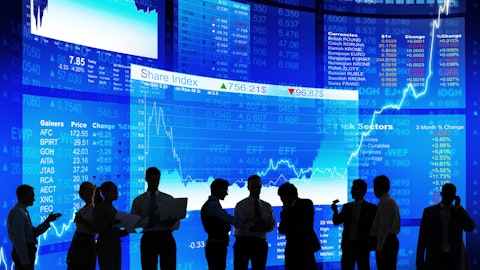Value investors have been complaining about the overvaluation in the equity markets for a very long time. Shiller’s cyclically adjusted P/E (CAPE) currently stands above 27, similar to where it stood in May 2007 near the top of the 2007 housing bubble. We should note that CAPE stood at 43 at the peak of the 2000 stock market bubble, so it isn’t at extreme levels. Other market participants claim that stocks aren’t very expensive compared to long-term bonds.
Ten year Treasury bond rate doubled since this July (from 1.3% to 2.6% today), yet stock prices kept going up. This baffles several investors including a Canadian value investor, Trapeze Asset Management’s Randall Abramson, whose funds have $300 in assets under management. In this article, we will share his latest views about the markets as well as individual stocks. Surprisingly he sees a lot of value in two of the following four stocks: Alibaba Group Holding Limited (NYSE:BABA), Apple Inc. (NASDAQ:AAPL), Amazon.com, Inc. (NASDAQ:AMZN), and Facebook Inc. (NASDAQ:FB).
Apple Inc shares kept up with the overall increase in the stock market since Trump’s election victory, whereas Facebook Inc, Amazon.com Inc, and Alibaba Group Holding Limited actually delivered negative returns. Before getting into Trapeze Asset Management’s take on these stocks, we want to share a few excerpts from their investor letter that lays out their take on the overall stock market.
“Everything feels a little backwards. President Trump getting more unsavoury in his behaviour yet managing nonetheless to win the election, despite polls to the complete contrary. The Chicago Cubs winning too. U.S. stock markets hitting all-time highs and, though fully valued, active investing being completely shunned in favour of passive. Many bonds carrying negative yields. Relative debt levels surpassing those prior to the Great Recession yet the volatility index, a measure of fear, near its lows.
And in the financial world, the most bizarre occurrence recently has been the rally in the stock markets post election. The market suffered 9 consecutive down days through early November as it dealt with rising interest rates and the uncertainty around the election results. Why the run-up post election when so many forecast a rout? Likely, for a number of reasons. What financial markets despise more than just about anything is uncertainty. With the outcome known, the markets readjusted. Furthermore, Trump’s initial comments were somewhat conciliatory, tempering nervousness. But the primary driver of the market boost came from rising interest rates—a result of foreigners selling U.S. government bonds and rising inflationary expectations. The rate of 10-year U.S. Treasuries rose from a multi-year low of around 1.3% in July to 1.8% pre-election and then post-election have jumped further to 2.4%. This is a boon to financial service companies whose earnings are dependent on higher rates on their float. So most financial stocks rocketed ahead, as did health care stocks that had previously fallen in anticipation of a Clinton win. The contribution of these 2 sectors set the tone for the overall market where gains have been relatively widespread. The spectre of lower corporate tax rates has helped too, especially for small caps—mostly domestic companies—where the Russell 2000 recently completed a 15-day consecutive winning streak.
At the same time, growth in the world economy seems to be accelerating again. Even in the Eurozone. China is in faster growth mode too.





